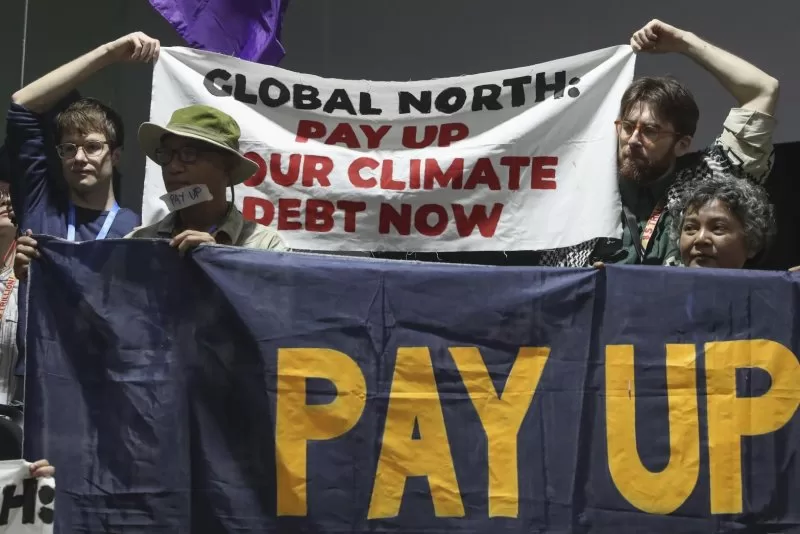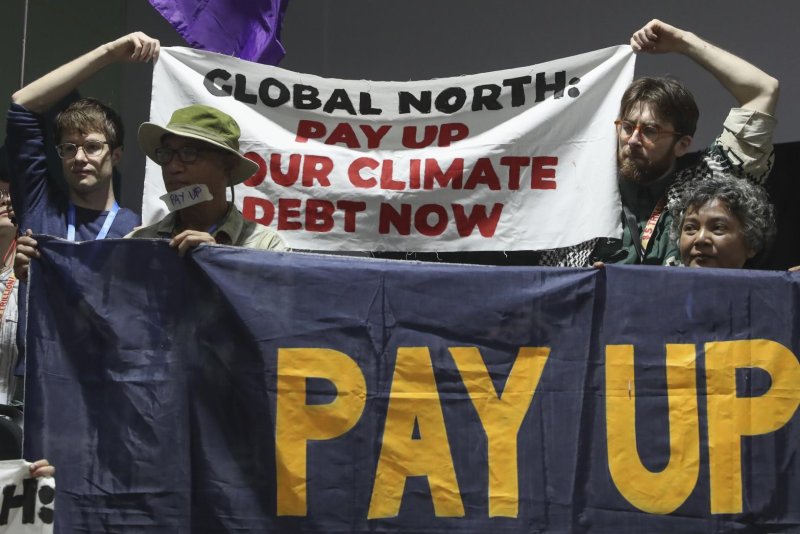A draft finance deal Friday at the U.N. COP29 climate and environment talks proposes wealthy nations give $250 billion a year to poorer nations in climate funding. Developing countries want more money. Here, climate activists attend a joint protest action Friday at the COP29 climate change conference in Baku, Azerbaijan. Photo by Igor Kovalenko/EPA-EFE
Nov. 22 (UPI) — A draft finance deal Friday at the U.N. COP29 climate and environment talks proposed wealthy nations give $250 billion a year to poorer nations in climate funding.
Developing countries, however, called for more money with negotiations in Baku, Azerbaijan, and expected to push talks into the weekend.
“A new draft finance deal delivered to harried negotiators in Baku on Friday — the final scheduled day for the U.N. climate talks that have been under way for the past two weeks — proposes rich countries commit $250 billion a year to help vulnerable nations cope with our warming planet and to accelerate the global switch to renewable energy,” the United Nations said in a statement.
The draft text called for an overall climate change financing goal of $1.3 trillion a year to developing countries by 2035, but the specifics on reaching that goal haven’t been worked out.
Developing nations and climate and environment advocacy groups think the $250 billion a year isn’t nearly enough to meet the scale of the global climate crisis.
“This is definitely not enough. What we need is at least $5 trillion a year, but what we have asked for is just $1.3 trillion,” Panamanian climate envoy Juan Carlos Monterrey Gomez told the Guardian. “That is 1% of global GDP. That should not be too much when you’re talking about saving the planet we all live on.”
Power Shift Africa’s Mohamed Adow said, “Our expectations were low, but this is a slap in the face. No developing country will fall for this. It’s not clear what kind of trick the presidency is trying to pull. They’ve already disappointed everyone, but they have now angered and offended the developing world.”
Namrata Chowdhary from the international environmental organization 350.org said in a statement, “It is a slap. It is insult. It is shocking that we are at this state now. The rich countries are basically gambling with the lives of people in the developing nations and small islands.”
Lidy Nacpil from the Asian Peoples’ Movement on Debt and Development said in a statement to U.N. News, “One of the issues that is preventing the Global South from undertaking urgent climate actions and from also providing our people with essential services that we need is the debt burden.”
And she added that climate finance should not come in the form of loans to developing nations because it adds to poorer countries’ debt.
The Climate Action Network’s Jacobo Ocharan called it a terrible deal.
“We urge all developing countries to have the courage in the negotiations to keep pushing, because this deal is terrible,” Ocharan said in a statement. “We keep pushing on the idea that no deal is better than a bad deal.”

